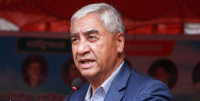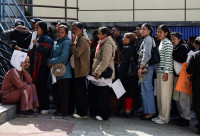National
International body rules in favour of Nepal government in Ncell taxation case
The Axiata Group had filed a case at the International Centre for Settlement of Investment Disputes in May 2019, claiming damages worth around Rs66 billion.
Krishna Acharya
Nepal government has won a case against Axiata Group, the parent company of Ncell mobile telecommunications company, in its dispute over the determination of capital gains tax (CGT) levied on the company during its acquisition of Ncell in 2016.
On May 20, 2019, the Axiata Group filed a case at the International Centre for Settlement of Investment Disputes (ICSID), an international investment dispute settlement body established by the World Bank, claiming damages worth $420 million (Rs55.54 billion), citing breach of the bilateral agreement, injustice and unjustified taxes levied on the company, justice for which, the company claimed, was also not given.
Besides claims of damages, as much as 16 percent interest till the date of payment from the beginning of filing of case and arbitration expenses were also sought.
“The case filed four years ago concluded on Friday as the ICSID ruled in favour of the Nepal government,” said Phanindra Gautam, chief of International Law and Treaty Agreement Division at the Ministry of Law, Justice and Parliamentary Affairs. “Had we lost the case, Nepal would have had to pay as much as $500 million or around Rs66 billion including interest and arbitration expenses. With the ICSID verdict, the main allegation levelled against us was that of justice not being served. Fundamentally, these charges have been dismissed.”
However, the government will still be liable to pay some amount of compensatory damages to the telecommunications conglomerate.
“The amount to be paid has not yet been finalised, although it will be a small price to pay for the huge problem we have gotten off of our backs,” Gautam said. “More significantly, the doubts of international investors that had clouded Nepal due to the accusations by Axiata have been cleared.”
Moreover, the state is no more liable to pay Rs66 billion as demanded by the company. In its case, the telecommunications conglomerate had demanded that the Nepal government return the capital gains tax amount that the state had levied on the company during its acquisition of an 80 per cent stake in Ncell.
The international body ruled that the state need not pay back the demanded amount.
Although Axiata had filed a case at the ICSID in May of 2019, the Nepal government had initially refused to participate in the legal procedure.
Later in October of the same year, the international investment dispute body itself appointed an arbitrator to advocate on behalf of Nepal to pursue the case further.
Following these developments, the Nepal government appointed five law firms—UK-based Nepali-origin lawyer Surya Prasad Subedi’s ‘Three Stone’, Washington-based law firm ‘Foley Hoag’, US-based legal practitioner of Nepali origin Khagendra Kshetry’s ‘Kshetry and Associates’, Nepal-based law firms Prudential Law Associates and Abhinawa Law Chamber—to represent itself in the case.
Additionally, constitutional lawyer Bipin Adhikari and former finance secretary Vidyadhar Mallik were also appointed as legal and tax experts.
The said case is a first where a Nepal-based company has called on an international organisation for help.
The Axiata Group had moved the Supreme Court challenging the tax evaluation, made by major audit firms, of a massive Rs40 billion that the company was liable to pay after its acquisition of Ncell.
The top court, however, had ruled in favour of the government in February 2019, following which the telecommunications conglomerate, in May of the same year, had taken its case to the international dispute settlement body.
The move came following Axiata Group’s acquisition of Reynold Holdings from Telia Sonera, a Norwegian telecommunications company, on April 11, 2016.
The case claimed that the Nepal government violated the bilateral investment promotion and protection agreement signed between Nepal and the UK on March 2, 1993.
Ncell’s parent company Axiata, though based in Malaysia, argued that the investment dispute must be settled as per British jurisdictions since the acquisition of Reynolds Holdings, a company registered in the British Virgin Islands, was made through Axiata’s subsidiary Axiata Investments, which is registered in the UK, making it a Nepal-Britain concern.
Reynold Holdings is the company that owns an 80 percent stake in Ncell.
The Nepal government, through its legal representatives, had argued that the case did not fall under international jurisdiction since the Office of the Company Registrar in Nepal was provided with no information when the acquisition was made as it was carried out through a shell company, based in a tax haven, to avoid paying taxes.
Telia Sonera didn’t pay the capital gains tax after selling its stocks to the Malaysian company. But concerns about an alleged tax evasion in the largest corporate deal in Nepal’s history didn’t die down.
After its 54th annual report, the Office of the Auditor General, for the first time, said the deal was taxable in Nepal as per Clause 57 of the Income Tax Act and stated that the government needs to raise Rs 32 billion as capital gains tax from the buyout deal worth Rs144 billion for an 80 percent stake. This report reinforced the belief that the deal is taxable and encouraged an anti-Ncell campaign.
In a public interest litigation filed with the Supreme Court on January 28, 2017 by six petitioners, including the former government secretary Dwarika Nath Dhungel, the Supreme Court ruled that since Telia Sonera had already left Nepal, Axiata and Ncell were responsible for the taxes.
Acting on the court’s February 2019 order, major audit firms carried out tax assessments on Ncell. As per their report, Ncell’s 80 percent stake was sold for Rs144.78 billion wherein a profit of Rs143 billion was made. The total capital gains tax was capped at 25 percent, which amounted to Rs35.91 billion.
An additional 50 percent penalty was levied due to the company’s failure to file taxes on time. With further interest, the total figure of tax to be paid stood at Rs62 billion. Although the company had already paid Rs23 billion of the total amount, Ncell knocked on the doors of the Supreme Court once again on April 22, 2019, claiming that it had been overcharged by Rs39 billion.
The company had claimed that its outstanding dues should be just Rs14.36 billion.
On August 26, 2019, the Supreme Court scrapped the tax determined by the Large Taxpayers’ Office for Ncell, questioning the authority’s tax determination process.
In the full text of this verdict released on November 21 of the same year, the Supreme Court said the private sector telecom company was required to pay only Rs21.1 billion in outstanding tax.
On December 6, 2019, the Large Taxpayers’ Office determined capital gains tax at Rs 22.44 billion, including fines and ordered Ncell to pay it by December 19. But the telecommunication company continued its legal fights at the international dispute settlement body.
“With the latest decision by the international body, the dispute has been settled by both the national as well as international bodies,” Gautam said.




 16.46°C Kathmandu
16.46°C Kathmandu














